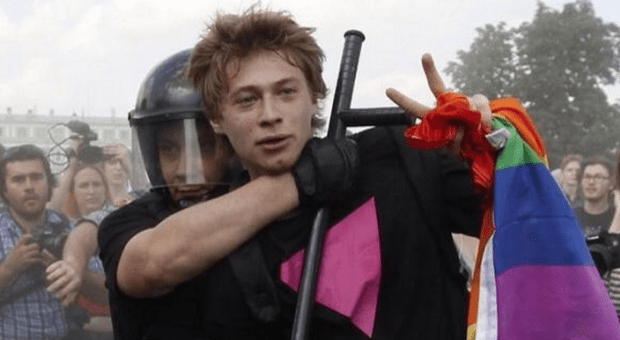
Gay activists are arrested and beaten at a Pride demonstration in June. Credit: RUSA LGBT
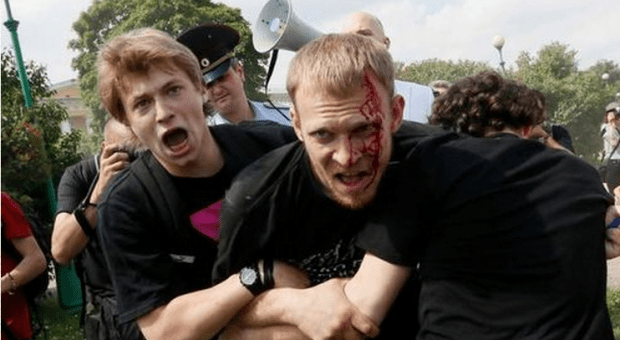
Gay activists are arrested and beaten at a Pride demonstration in June. Credit: davidmixner.com/lgbt-pride/
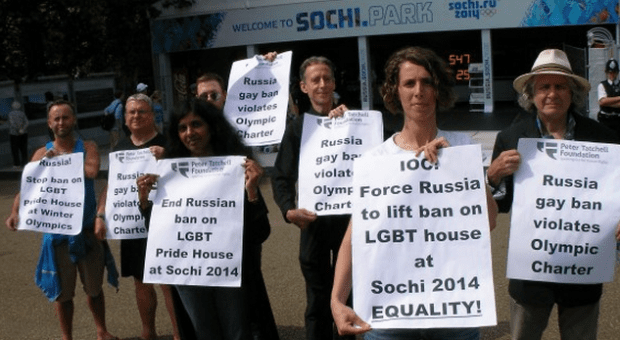
Gay activists protest Russia's total ban on having a Pride House in Sochi. Credit: Pride House Vancouver
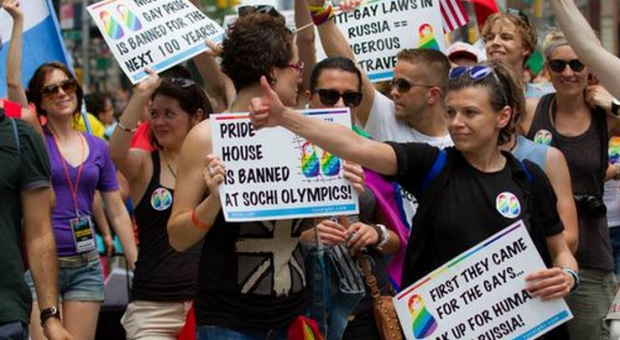
RUSA LGBT activists march in New York Pride, trying to raise awareness and mobilize support for a boycott of the Sochi Olympics. Credit: RUSA LGBT
Despite ongoing persecution of gay people in Russia, Blake Skjellerup, a gay speed skater from New Zealand, says he will be wearing a rainbow pin to the Sochi Olympic games in 2014, and “If that gets me in trouble, then so be it.”
“For me it’s less about taking a stand and more about just being myself,” he says. “I have no interest in going back into the closet in Sochi . . . This is not about defiance. This is me standing up for what I believe in.”
Skjellerup, who came out just after placing 16th in short-track speed skating in Vancouver and is currently training in Calgary, says he wants to be a role model. He encourages other athletes to follow his lead by wearing a rainbow pin.
“The Olympics are all about diversity and a celebration of humanity, and sexuality is included in that, so I will not be hiding that,” he says. “Russia will be very focused on putting on a very good show and painting Russia in a positive light.”
Russia’s increasingly hostile anti-gay crackdown has some questioning whether the International Olympic Committee (IOC) should have awarded it the Olympics at all. Earlier this month, Russian president Vladimir Putin signed a law banning “propaganda of non-traditional sexual relations.”
The law characterizes propaganda of “non-traditional sexual relations” as “spreading information in order to form non-traditional sexual desires in children, describing such relations as attractive, promoting the distorted understanding of social equality of traditional and non-traditional relations and also unwanted solicitation of information that could provoke interest to such relations.”
That means it is now illegal to say that you are gay in Russia. It is illegal to kiss a same-sex partner in public — say, after winning a gold medal. It is illegal for a gay athlete to wear the rainbow flag, talk positively about being gay in an interview or express support for gay friends and family members.
Just this week, three Dutch citizens were detained on gay propaganda charges. A June Pride march in Russia ended in violence, with many marchers beaten and hauled away by police, their faces dripping blood.
The grisly images have led to renewed calls for a boycott. In an op-ed in the New York Times, actor and playwright Harvey Fierstein compares Russia’s violent political climate against gays to the persecution of Jews in Nazi Germany. Much like the international cries for a boycott during the 1936 Olympics in Germany, Fierstein says history is repeating in Russia and calls on the international community to mobilize.
But athletes disagree. “I’m not in favour of a boycott at all,” Skjellerup says. “I think visibility is the best possible solution, as opposed to hiding away and not attending.”
The IOC recently released a statement promising to “work to ensure” that the Sochi Games take place without discrimination against LGBT participants. But the statement from the Lausanne, Switzerland-based organization was short on specifics, only reiterating support for LGBT athletes and opposing any discrimination against them.
While Skjellerup says he trusts the IOC, safety remains his major concern, especially since there will be no Pride House for gay athletes to take refuge in.
The Canadian Olympic Committee did not respond to Xtra’s request for comment. Steve Podborski, the chef de mission for Canada’s 2014 Olympic Team, could not be reached for comment.
For its part, the Canadian government has been largely silent on the issue. Foreign Affairs Minister John Baird, whose sexuality has been discussed in mainstream media like an open secret, declined an interview. Rick Roth, Baird’s press secretary, sent a statement: “This latest development in Russia is extremely troubling and Canada has raised its concerns directly with Russian authorities. Canada follows the human rights situation in Russia closely and the promotion of Canadian values has and will continue to feature prominently in our ongoing dialogue.”
When pressed about how Canada will ensure the safety of everyone attending the games, including its athletes, the media, family members and other LGBT travelers, Roth tells Xtra that anyone planning to attend the Sochi Olympics should consult the Canadian government’s travel advisory, which recommends travelers “exercise a high degree of caution.”
But that’s simply not good enough for Russian LGBT activists like Yelena Goltsman, the founder and co-president of RUSA LGBT, a Russian LGBT group based in New York. Goltsman says her group is part of a growing chorus of Russian LGBT activists calling for a complete boycott of the Sochi Olympic games.
“We think a boycott is very powerful,” she says. “Especially for people planning to travel to Sochi, they should reconsider. It’s not fair to ask athletes not to go. It’s not their fault. But maybe they can make a statement, and that can come from many counties.”
The group, which is manufacturing rainbow pins to send to all the athletes going to Sochi, wants LGBT people and allies to also consider boycotting the major sponsors of the games, which include Coca-Cola, Omega Watches, VISA, PriceWaterhouseCoopers, Procter & Gamble, Samsung, McDonalds and Panasonic.
“People in Russia are really frightened and feeling a lot of pressure,” she says. “We need people and politicians to speak out, and we need the IOC to encourage that.”
Goltsman says the rising violence against LGBT people in Russia is incompatible with Olympic values. With the opening ceremonies seven months away, she says world leaders need to speak out strongly now.
In May, a young gay man was brutally murdered in the southern city of Volgograd. His attackers beat him, shoved bottles into his anus, set his clothes on fire and crushed his head with a rock. Investigators took the rare step of linking the murder to homophobia.
Xtra has requested an interview with Russia’s ambassador to Canada, but has received no response from the consulate in Toronto or Ottawa. The Russian consulate in Toronto asked for a list of questions, which Xtra sent. The consulate has not responded.
Matthew Cutler, director of development and community engagement at The 519 Church Street Community Centre, which will be Toronto’s Pride House for the Pan Am Games in 2015, says it’s important to remember that Olympic athletes train their entire lives to compete, so asking them to stay home is unfair.
“For many athletes, this is their lifelong dream, and it might be their only chance to medal, so I can see why athletes may not support a boycott,” he says. “Now, if you’re talking about boycotting the big corporate brands affiliated with the IOC with company policies that celebrate diversity, that’s different.”
Dean Nelson, CEO of Gay Whistler, who helped create the first ever Pride House at the 2010 Vancouver Olympics, says there is chance visas could be denied to gay athletes, travelers, media, trainers, coaches, fans and family members.
“Anyone applying for a visa, if they are an outspoken gay activist, it’s most likely that they could be denied,” he says. “For an athlete to have their visa denied, in my opinion, probably won’t happen, but it certainly could happen. I can’t see the Russian government taking on that battle, but who knows. Putin has no respect for human rights.”
If Russia was to reject the visa of anyone associated with the Olympics because they are queer or an ally, that would “be a significant diplomatic and political statement,” Cutler says.
Boris Dittrich, LGBT advocacy director for Human Rights Watch (HRW), says no one who supports LGBT equality and freedom is safe in Russia right now.
“No, tourists, athletes, fans, nobody is safe in Russia, because when you say or do something in public which is not negative about homosexuality and minors are involved, then you run the risk of being arrested, detained, fined and deported,” he says. “The IOC should take a strong stand and demand from Russia not to enforce these hideous laws. HRW is against a boycott of the games because we want to put pressure on Russia.”
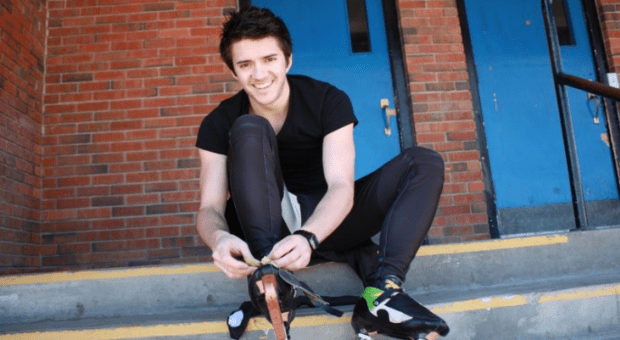
 Why you can trust Xtra
Why you can trust Xtra


